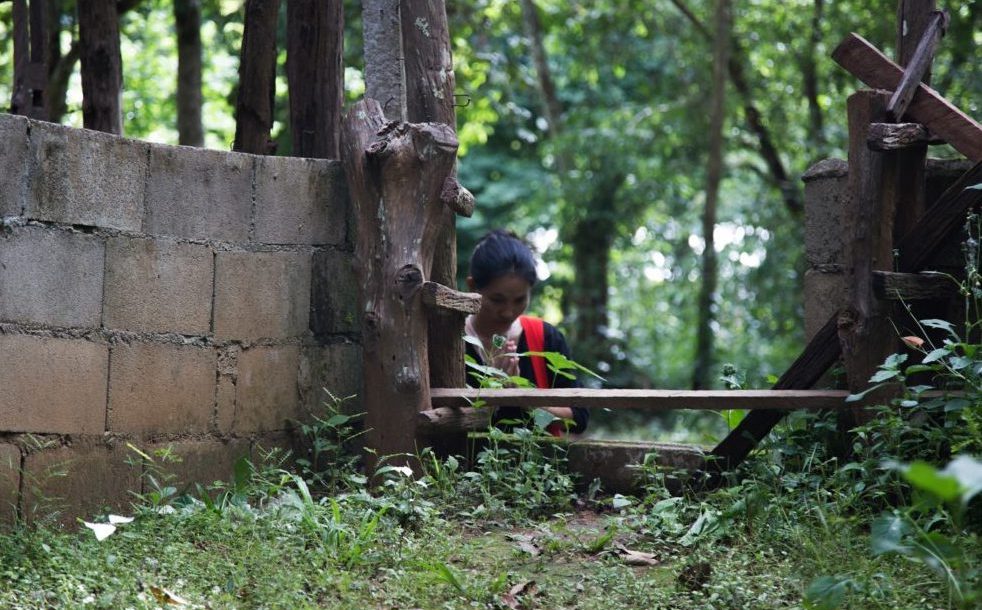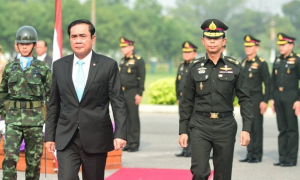Surrounded by low-hanging clouds, mud and chickens in a village deep in the northern hills, a young woman tells me, “We are not Thai and we try not to be Thai. Sometimes I find myself talking to my family in Thai and I think, ‘No, try to be Lisu’”. Katima is an activist and member of one of Thailand’s myriad ethnic minorities. The Lisu people are spread across Thailand’s northern hills, deep into north-eastern Burma and southern China. They are a stateless people with language, culture, religion and practices that are completely distinct from any of the national states that envelope them.
In The Art of Not Being Governed, anthropologist James C. Scott makes the case that the Lisu (and many of the other ethnic minorities found in upland southeast Asia) are culturally and materially anti-state. Their fluidic language, culture, lack of alphabet and semi-nomadic living practices developed as a response to escape the reach of the states that would have had them as productive subjects who store grain, deliver taxes and provide soldiers. The Lisu and other similar groups were free of these obligations and were able to live under their own community governance. Scott argues that they have tried—consciously or not—to make themselves an unconquerable population.
Down the road sits the local government office. Built around 20 years ago, it marked the first formal governing presence in the lives of the local people. “When I was a kid, we used to have no hospitals, no schools, no government,” Katima tells me. Today the office is coated in flags and murals dedicated to the monarchy and nation-state. Those who work in the office are not locals, but Thai people brought in to govern the Lisu population. The same is true of the teachers in the local government schools: Thai civil servants assigned to teach the national curriculum. There has also been a concerted effort to build Buddhist temples in these more remote areas, which serve to supplement and eventually replace the animist spiritual beliefs held and practised by the local people.
This extension of the state is a clear and direct plan originating from 20th-century policies of ‘Thaification’ formulated by the central government. Beginning in 1933, dictator Plaek Phibunsongkhram oversaw a massive nationalist overhaul of the state’s relationship towards ethnic minorities. Notable policies included harshly enforcing the Thai language in the education system, reinforcing the relationship between the monarchy and population, and issuing the 12 Core Values—a kind of nationalist guide to ideal ‘Thai’ behaviour, ways of living and etiquette.
A negotiation
Even today, some Thai officials are scared to go into Lisu villages. There are stories of government officials being detained by angry villagers over land rights conflicts. “It’s definitely happened before,” a resident tells me. “The Lisu people came out with knives and bats and the Thai officials had to negotiate for their release.”
Another young Lisu woman, who wanted to go unnamed, describes government involvement in Lisu life as a negotiation. “We accept some of the things the government offers us, like schools, hospitals, temples. But we are still Lisu … The defiance is at home and in the community, where we will continue to do our customs and live our own way of life. We won’t really assimilate”. Most local people don’t feel the government has any influence over them.
In the north of the country, one of the state’s most effective arms is without a doubt the Royal Project, which was inaugurated in the late 60s as a means to replace opium crops grown in the hills by ethnic minorities with fruits and vegetables. The agricultural products produced for the Project are sold to a state-operated company which distributes them throughout the kingdom, leaving the locals dependent on the state for their material wellbeing.
In the early days, the Project was funded and supported by the United Nations. Besides crop replacement, an added and intentional benefit was the absorption of minorities into the activities of the Thai state, with the aim of keeping them from being drawn into the drug trade or from joining the communist insurgencies which were flaring up across Southeast Asia at the time.
Today Royal Project stations, which can be found throughout the hills, technically serve the purpose of agricultural research and development. They also act as laybys for domestic Thai tourists from urban areas—embassies of a kind to help central Thai people feel acquainted with the faraway hills. The outposts are a continuous source of soft power for the central government to ingratiate officials with the local population and absorb their activities into the nation-state.
Anti-state fight/flight
The same anti-state culture is exhibited by the Maniq people in the deep south of the country. The Maniq are nomadic hunter-gatherers who live in the heavily forested national parks near the Thai-Malay border. Like the Lisu, they have their own language, culture and no alphabet. But unlike the Lisu, the Maniq refuse to even negotiate, rejecting literally all aspects of modernity in favour of a far more traditional existence. Even today they live without electricity, permanent housing or any of the trappings of modern life. They find food from hunting with slingshots and poison-tipped blow darts, or by foraging in the forest.
Maniq groups typically consist of around 30 individuals. They live nomadically and communally with no concept of private property and without hierarchy. Their total population, confined solely to these hills, is estimated at only around 200.
Historically, the Maniq people have suffered tremendously at the hands of outsiders. There are two key words in Maniq language, which one quickly learns when spending time with them: ‘Maniq’ (‘us’) and ‘Hamiq’ (‘them’). “You are either of the forest or of the town. Maniq or Hamiq,” Speaker Kai tells me. (The role of Speaker in Maniq society is literally that of a communicator—a speaker for the group. As there is no hierarchy in the community, the Speaker is by no means a leader. Rather they listen to the many voices of the group and communicate the consensus with outsiders.)
The key to the Maniq’s survival so far has been their flight reflex. They’ve spent thousands of years literally running away from settled society, and are well known for being extremely wary of outsiders. But today that nomadic lifestyle, particularly as it concerns conceptions of private property, inevitably results in constant clashes with the Thai legal system. Their lack of formal identification runs parallel to Thailand’s great state bureaucracy. Meanwhile their seclusion and isolation leaves them ripe for exploitation from illegal loggers and poachers. Plantations and farmlands have also been squeezing the Maniq’s living area for centuries, shrinking it at an astronomical rate.
James C. Scott made the case that the geographic conditions of Southeast Asia historically made state building no easy task. Evidence of this historical lack of state reach is still clear in the lowlands of Thailand, where almost every region—even the provinces immediately outside of Bangkok—have a distinct dialect or even language. For example, many rural people in provinces such as Surin (450 kilometres from Bangkok in the flatlands of eastern Thailand) speak upwards of four languages: Khmer, Lao, Surin and the most recent addition, Thai. The people of Surin also have religious practices and cultural points of reference which are not found in mainstream Thai culture.
Such communities live as proof of a Thailand before it was ‘Thaified’—a place rich in diversity and bound by communal strength in local identities. But these communities are rapidly fading under the ever-growing reach of a state able to replace local identities with a national one. Yet opposition still exists in different guises, particularly in the hills, from the Lisu in the North to the Maniq of the South.
Speaker Kai pointedly says of the Thai government, “They want us to settle down, grow food, go to their schools, be like them. We can’t live like that”. The Thai state has made efforts to control the Maniq including issuing ID cards, which quickly disappear. A forced resettlement project, where they were made to live in permanent housing on a kind of reservation in Phattalung province, was apparently seen as an act of charity by the state. The experiment didn’t last long as the Maniq ran away and escaped back into nomadic jungle life. “We don’t want charity or help. I just want my kids to grow up like I did. I want them to be Maniq, to live as Maniq,” Speaker Kai tells me. “We just want some land to live off of and to be left alone”.
This is pure anti-state ideology: a refusal to take part in any kind of settled civilisation with powers that supersede their own control. Still, above the Maniq’s temporary forest shacks fly two flags: one Thai national flag and one Thai royal flag. They were erected by the Maniq as a show of good faith to the local Thai plantation owners and national park rangers who have been harassing them for decades. Pessimism about their future is inevitable as the veins of settlers stretch ever deeper over the hills and into the forest. Speaker Kai’s message to the outside world rings out: “We want to be left alone”.
 Facebook
Facebook  Twitter
Twitter  Soundcloud
Soundcloud  Youtube
Youtube  Rss
Rss 


